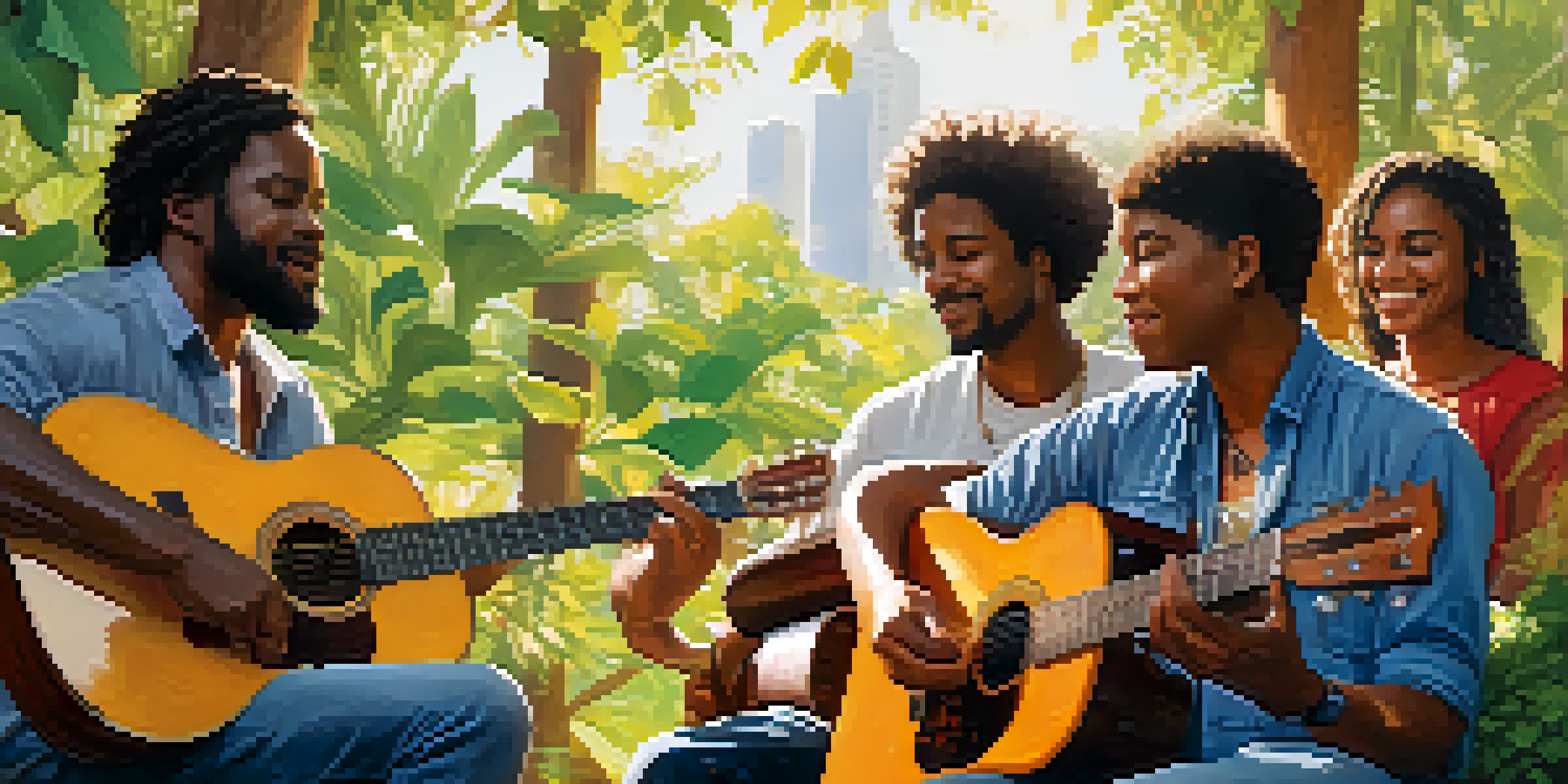The Guitar: A Voice for Marginalized Cultural Voices

The Guitar's Role in Cultural Expression
The guitar has long been a staple in music, transcending borders and languages. Its versatility allows artists to express a wide range of emotions and stories, making it an ideal instrument for marginalized cultures. From folk traditions to contemporary genres, the guitar serves as a bridge connecting diverse communities through shared musical experiences.
Music is the universal language of mankind.
For many, the guitar is not just an instrument; it’s a voice that articulates struggles, joys, and hopes. In various cultures, musicians use the guitar to narrate their histories, bringing light to issues that often go unheard. This unique ability to convey deep cultural narratives makes the guitar an invaluable tool for social change.
By embracing the guitar, marginalized voices can reclaim their narratives and assert their identities. This instrument becomes a canvas where cultural heritage and modern influences merge, creating a richer, more inclusive musical landscape. The stories told through guitar music resonate widely, fostering empathy and understanding among diverse audiences.
Historical Perspectives: The Guitar and Marginalized Cultures
Throughout history, the guitar has been intertwined with the stories of marginalized communities. From the blues of African American musicians to the flamenco rhythms of Spanish Romani culture, the guitar has been a vehicle for expressing resilience and creativity. These musical forms not only highlight cultural richness but also address social injustices faced by these communities.

In many cases, the guitar has been a means of resistance, serving as a tool for political and social commentary. Artists like Woody Guthrie and Joan Baez used their guitars to advocate for civil rights, inspiring movements and igniting change. Such historical examples illustrate how the guitar can amplify voices often silenced in mainstream narratives.
Guitar as a Voice for Change
The guitar empowers marginalized communities to express their struggles and stories, fostering social change through music.
As we explore the past, it becomes evident that the guitar has played a pivotal role in shaping cultural identities. It represents a fusion of tradition and innovation, allowing marginalized musicians to carve out their own spaces in the music industry. This legacy continues to inspire new generations of artists to harness the power of the guitar for their own storytelling.
Diverse Genres and Their Cultural Significance
Various musical genres have embraced the guitar, each with its own cultural significance. For instance, reggae music emerged from Jamaica, using the guitar to communicate messages of peace and resistance. This genre highlights how the guitar can reflect the struggles and aspirations of its community, resonating with audiences worldwide.
The guitar is a small orchestra. It is polyphonic. Every guitar is a different color, a different voice.
Similarly, the sounds of Latin American music, such as bossa nova and mariachi, showcase the guitar's role in celebrating cultural identity. These genres not only entertain but also educate listeners about their rich histories and traditions. The guitar becomes a symbol of pride, allowing artists to showcase their heritage on a global stage.
As we delve into these diverse genres, we see how the guitar fosters a sense of belonging among marginalized communities. It provides a platform for artists to express their unique cultural narratives, strengthening connections with their roots while reaching out to new audiences. This blending of tradition and contemporary influences creates a vibrant musical tapestry.
The Guitar as a Tool for Social Change
The power of the guitar extends beyond entertainment; it is a potent tool for social change. Musicians have used their platform to raise awareness about pressing issues, from poverty to inequality. Through songs that inspire and provoke thought, the guitar becomes a catalyst for dialogue and action within marginalized communities.
Organizations and initiatives that support musical education often harness the guitar’s appeal to empower youth. Programs teaching guitar skills not only foster creativity but also build confidence and self-expression. This approach helps young people from marginalized backgrounds find their voices and share their stories through music.
Historical Importance of Guitar
Throughout history, the guitar has been a tool for resilience and creativity among marginalized cultures, shaping their identities.
Moreover, collaborative projects between artists from different cultures often highlight the guitar's unifying power. These partnerships create cross-cultural dialogues that promote understanding and solidarity. By working together, musicians can amplify their messages and advocate for social justice on a broader scale.
Modern Platforms: Amplifying Marginalized Voices
In today’s digital age, the internet has transformed how marginalized musicians share their voices. Platforms like YouTube, SoundCloud, and social media enable artists to reach global audiences, bypassing traditional gatekeepers. This democratization of music allows diverse stories to be told, with the guitar as a central instrument in many of these narratives.
Emerging artists are using these platforms to showcase their unique sounds and cultural backgrounds, often blending traditional guitar styles with contemporary genres. This fusion resonates with listeners and draws attention to the diverse influences shaping today’s music scene. As a result, the guitar becomes a symbol of innovation and cultural pride.
Moreover, online communities offer support and connection for marginalized musicians, fostering collaboration and creativity. These spaces encourage artists to share their experiences and learn from one another, strengthening the sense of community. Through these modern platforms, the guitar continues to serve as a voice for those who have been historically overlooked.
Challenges Faced by Marginalized Musicians
Despite the guitar's empowering potential, marginalized musicians often face significant challenges in the industry. Issues such as lack of access to resources, representation, and fair opportunities can hinder their ability to thrive. These barriers can make it difficult for talented artists to share their stories and connect with wider audiences.
Furthermore, cultural appropriation can complicate the narrative, as mainstream artists sometimes borrow from marginalized cultures without proper acknowledgment. This often leads to a dilution of the original meanings and stories that the guitar represents. It’s crucial for audiences to understand the cultural significance behind the music they enjoy.
Modern Platforms Amplify Voices
Digital platforms allow marginalized musicians to share their cultural narratives globally, promoting innovation and connection.
Addressing these challenges requires a concerted effort from the music industry, audiences, and policymakers. By advocating for equitable representation and support for marginalized musicians, we can help ensure that the guitar remains a genuine voice for diverse cultural expressions. This effort is essential for fostering a more inclusive and representative music landscape.
The Future of the Guitar in Cultural Dialogue
Looking ahead, the guitar will continue to play a vital role in cultural dialogue and expression. As communities strive for recognition and visibility, the guitar serves as a powerful medium for sharing stories and experiences. The instrument's adaptability allows it to evolve alongside changing cultural landscapes, ensuring its relevance for future generations.
Emerging technologies and trends, such as virtual performances and collaborations, will further expand the guitar's reach. These innovations make it easier for musicians from marginalized backgrounds to share their music and connect with global audiences. The potential for cross-cultural collaboration is limitless, fostering a sense of unity through music.

Ultimately, the guitar will remain a symbol of hope and resilience for marginalized voices. As artists continue to harness its power, they will inspire future generations to share their stories, advocate for change, and celebrate their cultural identities. With every strum, the guitar amplifies the voices that deserve to be heard.